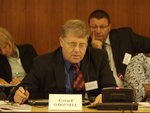Everard O’DONNELL
contribution 19 -
O’DONNELL Everard

tags
Preventive detentionoriginal version
Well, I suppose I could reply to everything, but it would be unnecessary. I will leave that to Guindo to deal with the specific issues. I’ll just say that that path, that dirty path, is one that I use every time I go into the UNDF. Sometimes people come from the perfumed gardens of Europe and from North America and they somehow think that when conditions in East Africa are offensive to them that this is somehow sometimes our fault, particularly dirt or anything you like.
You only have to go 50 metres from the UNDF into the Tanzanian prison to know what prison conditions really can be like in East Africa. I had to explain this to the Red Cross every time they come, that, you know, you have to understand the context, otherwise it makes no sense.
I just really wanted to deal with this provisional release issue because it is very important. It is one that I do not think that we can be proud of.
We have, it was mentioned by one of the counsel, the length of trial issue, and we haven’t really dealt with that. I hope that at some point the President will be able to intervene and tell us about some of the steps that he has taken to increase the efficiency and expedition of trials by trial management processes.
But there is no doubt about it, both in terms of the length of trials that were going on and in terms of length of pre trial detention, we have nothing at all to be proud of in the ICTR. We are very conscious of that. We are actually some of our own strongest critics, believe it or not.
And it really is a matter of resources. At the time when Mr. Dieng and I arrived at the Tribunal, there was only one trial sitting , and the judges were very overburdened [with pre-trial work]. All our efforts have been designed, or his efforts, in particular, have been designed to expanding trial capacity, expanding the judiciary, expanding all the mechanisms that allow the trials to go through forward with expedition.
But it has been extremely difficult, because you as taxpayers in your own national jurisdictions presumably would also think that the criticisms the ICTR gets for being expensive, which the President said, of course, do not really have a good foundation. But you are concerned about increased expenditure.
One of the shocks that the international community had when it asked for the increase in the rate of trials to take place back in the year 2001 2002 was that, in fact, we told them it will double the bill. And they were horrified by this simple fact. But you have to pay for increased trial capacity. You cannot have it for free.
So, therefore, yes, even though we did follow the ICTY in the abolition of those terrible words in Rule 65 on provisional release which said, “in exceptional circumstances” the Trial Chamber may grant provisional release, we abolished them in due course. It actually made no difference in actual fact, because and you have to understand when you are talking about the model of the ICTR, people make these very naive comparisons with the ICTY. But, in fact, the geopolitical situation of the ICTR is completely different.
Reference was made yesterday during the course of the successive attacks upon the Office of the Prosecutor to all the comparisons that can be made with the situation in the former Yugoslavia. But the important point to remember is that when we catch our fugitives, they are hiding under assumed names as illegal residents of whatever country we track them to. We bring them to Arusha. And we have no police power to be able to supervise their absence in whatever country you send them to for provisional release purposes. So if we were to release them, they would just disappear once again, and you would have to start tracking them again.
It’s a completely different situation from Yugoslavia where you always have a client country to which the person can go. There is always somewhere where they will go and you will be able to supervise them and bring them back. This is not the situation in the ICTR.
But, without any question, the excuses that we have given, and I suppose here I am talking out of turn, but now I am no longer a staff member of the United Nations I suppose I can confess it in public, I think that the excuses that we have given for the length of time that people have spent in pre trial custody are simply nonsense.
A. GARAPON
Adame Dieng, just before the break. Before maybe, Mr. Guindo.

